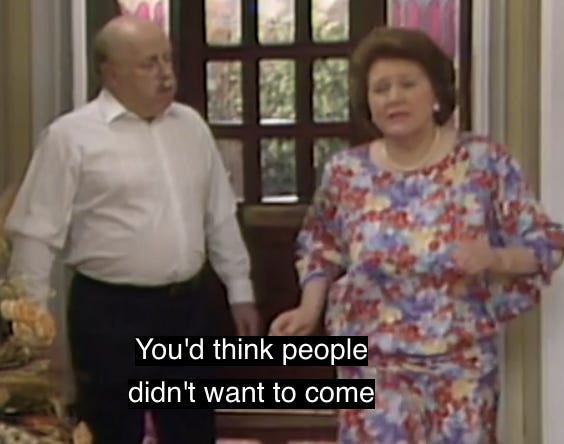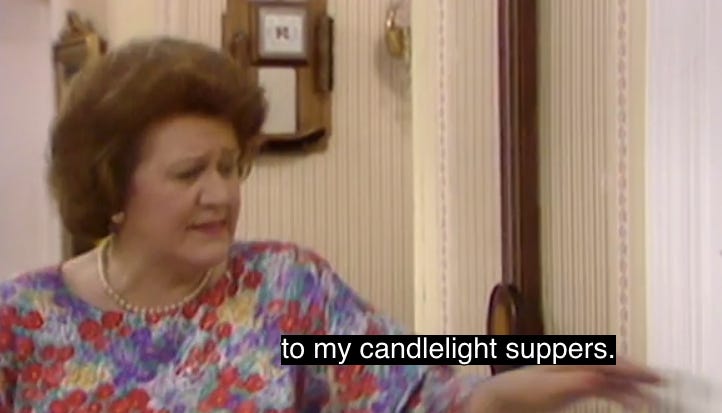Hyacinth of "Keeping Up Appearances": the tragic interpretation
If you were Hyacinth, would you even know??
Hyacinth Bucket sends people running. “It’s the Bucket woman!” they cry—“they” being other ladies in their town, the vicar, etc.—and suddenly, a room she was about to enter has emptied out. She is so universally disliked that neighbors line up to wave goodbye dramatically when she goes away for a few days. An invitation from Hyacinth elicits one of two responses: a no (from the distant, or clever) or a coerced, miserable yes (typically from next door neighbors Elizabeth and Emmet). Everyone finds her awful: pretentious, loud, judgmental. But she has no idea! She interprets even rejection in a flattering light. Emmet surely declines her coffee invites not because he can’t stand her, but because he is in love with her.
None of us know, as in really know, if others like us. And for most, there isn’t going to be any one true answer to that question. We’re for some tastes, not others. If you’re not running for election, or in middle school (literal, or a middle school of the mind), you live with this ambiguity.
But there are the occasional people who are just about universally disliked in social settings. I once had a classmate like this, where I’d feel bad for her that this was her situation, and would be encouraged to befriend her, but she was just so cruel to everyone, so snide, that it was hard to see her friendlessness as the result of a hostile world, even if, in a chicken-and-egg way, maybe it was.
But this girl, I think she knew she was disliked, just not what to do about it. Hyacinth? Utterly oblivious. She cannot imagine a universe in which not everyone is thrilled to see her, and eagerly awaiting her phone calls. As with my classmate, she’s disliked for entirely legitimate reasons. And it’s not just the snobbery, the “It’s pronounced Bouquet,” or the constant boasting about her one rich sister. Whenever Hyacinth has a conversation of more than a moment with someone, she insults them. Elizabeth is too frumpy and underdressed for the occasion, or (in a loose, longsleeved, opaque, ankle-length house dress) too scantily-clad. Elizabeth’s daughter, a college student like Hyacinth’s son, is, unlike precious Sheridan, an idiot. Why would Elizabeth like her?
I want to say that Hyacinth’s obliviousness to others’ revulsion is actually fine, because what she wants is to social climb, to compete, not exactly to connect with other human beings. But common sense suggests she’d be devastated if she knew. She has feelings! Unlike most outcasts, Hyacinth is friendless but hypersocial. She enjoys nothing more than entertaining. She cares so much about being part of society, but doesn’t entirely seem to get what that means on an interpersonal level. She’s not proudly unselfaware, like Archie Bunker. She simply has no idea.
Am I Hyacinth? Are you? Is everyone a little bit Hyacinth? Or does she, at the very least, represent some deep-seated human fear, that the way you think others see you isn’t just a bit different from what you’d imagine, but that the two things have zero overlap? Because imagine being Hyacinth. That would be the worst.




